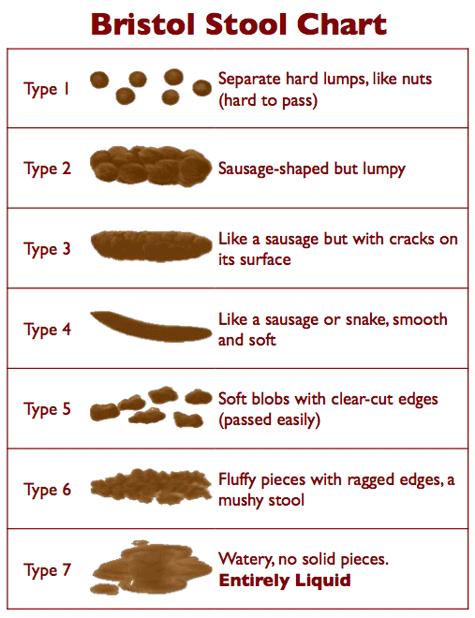
By Samantha Coffin, Health Coach and Office Manager
Did you know our Bowel Movements (BMs) can tell us a lot if we pay attention? Sounds simple right, but who really talks about poop other than doctors and parents of young children? Not many of us! Therefore, we are missing out on a way of learning what our body needs!
When we talk about BMs, we usually refer to the Bristol Stool Test. It breaks down BMs into 7 types and is widely used to help clinicians who are working with patients experiencing gastrointestinal discomfort and disorders.
Type 1 is likely severe constipation
Type 2 is mild constipation
Type 3 is normal
Type 4 is ideal
Type 5 is not quite normal but not quite diarrhea
Type 6 is mild diarrhea
Type 7 is severe diarrhea
Here is a visual for you to better understand what each type looks like.

STAYING REGULAR:
Alright, now that you know what your BM is saying, what can you do about it?
To start, it is important to note that some medications can impact your natural BMs. If this is true for you, we recommend communicating with your doctor. If medications are not of concern, here are some tips:
Exercise: Moving your body keeps your bowels moving. Simple enough right? You don’t have to do intense physical exercises. Walking for 30 minutes every day could have a tremendous impact.
Stay hydrated: We recommend that people drink 50% of their body weight in ounces of water every day. For example, if you weigh 150 lbs, you would drink 75 ounces of water a day to stay adequately hydrated. In the summer heat or when you are sweating a lot, drink more.
Avoid Inflammatory foods: Yes, this means alcohol, gluten, refined sugars, trans fats and processed foods. Truthfully, you’ll increase your overall health, not just your bowels if you avoid these foods.
Fiber-rich foods: Of course you have heard about fiber and BMs before. But what healthy foods offer good fiber? Here are some of our favorite ways to get healthy fiber:
- Fruit: Raspberries, Pears, Apples with skin, Bananas, Oranges, and Strawberries
- Vegetables: Broccoli, Brussels sprouts, Cauliflower, Carrots, Turnip Greens and
Green Peas.
- Fats and Proteins: Chia seeds, Almonds, Pistachios, Sunflower Seeds, Black
Beans and Lentils.
CONSTIPATED?
If you are experiencing constipation, absolutely move your body, get hydrated, increase your intake of fiber and avoid inflammatory foods but also:
Consider adding magnesium to your diet. Magnesium is an osmotic laxative, which means it pulls water into your digestive system, helping to get things moving. Many of our patients enjoy using Calm. Magnesium not only will calm your bowels, but also may help reduce your stress and aid in you getting a better night’s sleep.
Adding a tablespoon of coconut oil to your diet each day may help lubricate your intestines. You could add it to your coffee, in a smoothie or in a salad dressing.
Drink some kombucha or coffee. Kombucha is full of probiotics and antioxidants that are known to help reduce bloating and soothe GI discomfort, including constipation. However, if you don’t drink it often, we recommend you start slow. Coffee may help you pass a BM since caffeine can activate contractions in your colon and intestinal muscles. Other caffeinated beverages may help too, if coffee isn’t your thing.
DIARRHEA?
If you are experiencing diarrhea, be sure to stay hydrated and avoid any and all inflammatory foods and also:
Add live probiotics to your diet.
If this isn’t a one-time event, consider an elimination diet to rule out any food sensitivities and be sure to stay away from gluten, grains, dairy, refined sugars and processed foods. The Whole 30 program is a great way to discover how your body reacts to eating clean and slowing reintroducing foods that can cause inflammation.
While experiencing diarrhea, stick to foods that are simple such as bananas, rice, oatmeal, chicken.
No matter what BMs you are experiencing, if they are irregular or outside Type 3 and 4, listen to what your body is trying to tell you. We promise you are not expected to live with this forever or “just deal with it.” We are here for you!
If you are currently struggling with GI discomfort or any outside of the norm BMs, book a 15-minute health strategy session with Dr. Stefanacci today so we can get you on the road to wellness!
**Reminder: This is an educational article that does not constitute medical advice. It is always recommended to speak with your healthcare provider before implementing any of the above recommendations, especially if you have pre-existing conditions or are taking medications.
